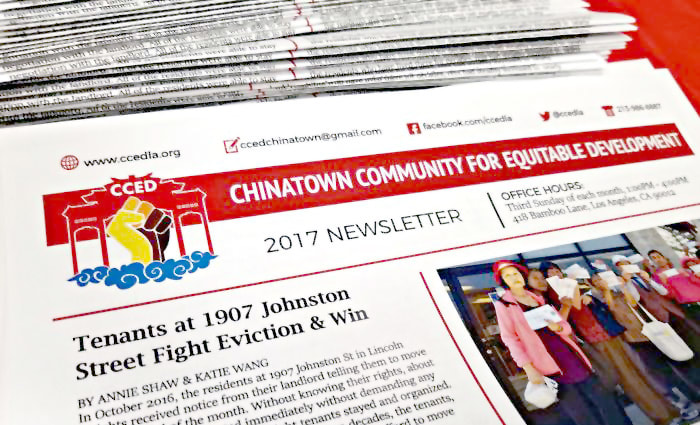Guiding Questions for Researchers and Creators Interested in Working with CCED:
- How is your research or creative work centering working class community and communities of color in Chinatown? What does that look like?
- What is the long term impact of your research or creative work? How do you see it informing/supporting CCED, progressive grassroots organizing, and efforts for systematic change?
- Can your work be easily understood by non-academics?
- How accessible is your work to the community you are focused on (e.g. language, digital vs. physical, distribution)?
- What are your plans for sharing, distributing, or disseminating your work?
- What will you be doing to support the community and anti-displacement efforts once you finish your research or creative work?
Cite as: Chinatown Community for Equitable Development. “Resources for Researchers and Creators.” Accessed [date] http://www.ccedla.org/resources.html.
- Contrary to popular perception, Los Angeles Chinatown is not an ethnic enclave: the neighborhood is highly diverse, with a population that is roughly two-thirds Asian and one-third Latinx.
- Chinatown is one of the lowest-income neighborhoods in Los Angeles, with a median household income of under $20,000.
- 94% of housing in Chinatown is renter-occupied.
What are affordable housing covenants?
Affordable housing covenants are contractual agreements between landlords and governmental entities to maintain a certain defined level of affordability in a rental apartment building. In Los Angeles, these covenants--many of which originate from the 1980s--are often set to last for 30 years. During the period of the covenant, the government will subsidize the landlord for keeping affordable housing units in the apartment. After the covenant expires, then the landlord is allowed to raise the rent on their apartment units up to market rate.
Why do they matter?
Los Angeles Chinatown has a high concentration of affordable housing covenants. As these covenants continue to expire over the next several years, more and more Chinatown tenants will be faced with de facto eviction via rent increase, as occurred at Hillside Villa.
How can I find more information about affordable housing covenants?
CCED has identified several Chinatown apartment buildings with affordable housing covenants set to expire soon. Identifying and verifying covenant buildings is an ongoing research need for CCED. If you would like to assist, please fill out our volunteer form and indicate your interest in helping us with this research project.
Affordable housing covenants are contractual agreements between landlords and governmental entities to maintain a certain defined level of affordability in a rental apartment building. In Los Angeles, these covenants--many of which originate from the 1980s--are often set to last for 30 years. During the period of the covenant, the government will subsidize the landlord for keeping affordable housing units in the apartment. After the covenant expires, then the landlord is allowed to raise the rent on their apartment units up to market rate.
Why do they matter?
Los Angeles Chinatown has a high concentration of affordable housing covenants. As these covenants continue to expire over the next several years, more and more Chinatown tenants will be faced with de facto eviction via rent increase, as occurred at Hillside Villa.
How can I find more information about affordable housing covenants?
CCED has identified several Chinatown apartment buildings with affordable housing covenants set to expire soon. Identifying and verifying covenant buildings is an ongoing research need for CCED. If you would like to assist, please fill out our volunteer form and indicate your interest in helping us with this research project.







